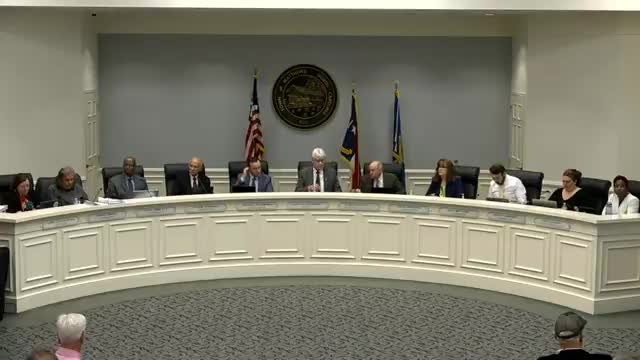Neighbors press commissioners to deny Abundant Life Church expansion; board continues rezoning to Jan. 12, 2026
Get AI-powered insights, summaries, and transcripts
Subscribe
Summary
The board continued rezoning application 2025816 from R‑20 to RI‑CD for Abundant Life Church after neighbors raised stormwater, lighting, tree loss and traffic concerns. Commissioners directed staff, the applicant and outside agencies to pursue further study and neighbor negotiations; the hearing was continued to Jan. 12, 2026.
The Matthews Board of Commissioners on Oct. 13 continued consideration of rezoning application 2025816 for Abundant Life Church at 3321 Matthews‑Mint Hill Road after extensive public comment and requests for additional technical review.
The applicant seeks to rezone approximately 4.94 acres from R‑20 to Residential‑Institutional Conditional District (RI‑CD) to allow phased expansion of church facilities. Pastor Brent Watts and civil engineer Jeff McCluskey presented a plan proposing a 15,250‑square‑foot addition in phase 1 and future smaller additions totaling about 4,350 square feet; the full build‑out would increase seating capacity from the currently reported 327 seats to 530 and raise on‑site parking from 97 to 194 spaces.
Neighbors and several commissioners objected to the proposal’s scale and potential impacts. Residents living immediately behind the property described chronic yard flooding and erosion they said occurred after prior church work, and they asked for written assurances before any rezoning approval. One neighbor told the board the church property “sits about 15 feet above the rest of our properties,” and that “adding almost a 100 cars to 51 will definitely increase the congestion.” Others called for preservation of mature trees as a natural buffer, relocation of the dumpster, lighting hooding, and additional analysis of stormwater impacts.
Planning staff said the application currently shows a 20‑foot minimum buffer to adjacent residential parcels (the UDO minimum) and that the project will be required to meet the town’s tree‑canopy requirement (15%) and post‑construction stormwater rules (water quality and quantity controls). Staff also noted the applicant submitted a transportation technical memo that estimated the project would add about 95 daily trips and about six peak‑hour trips; the North Carolina Department of Transportation’s 2024 AADT for Matthews‑Mint Hill Road is about 22,000. The memo therefore did not meet the town’s thresholds requiring a full traffic impact analysis for larger trip increases.
Commissioners and staff discussed whether the applicant could secure additional property north of the site to shift the driveway (NCDOT previously denied a driveway relocation because the proposed alignment would not match adjacent intersections). Commissioners asked staff to work with NCDOT on whether interim lanework or a median might change the driveway alignment options.
After extended discussion, Commissioner Herb McCool moved that the board continue the hearing to Jan. 12, 2026 (the board’s first meeting after board turnover) to allow staff to coordinate stormwater and NCDOT reviews and for the applicant to address resident concerns; Commissioner Leon Threet seconded. The motion passed unanimously.
Why it matters: The rezoning would allow a significant increase in assembly capacity and parking adjacent to established single‑family neighborhoods. Neighbors argued the proposal as drawn removes mature buffers, increases impervious surface and could exacerbate flooding. Commissioners emphasized the need for a fuller technical record and more neighbor‑applicant dialogue before a zoning decision.
What’s next: Staff was directed to coordinate with Mecklenburg County and NCDOT, review stormwater solutions (including possible enhanced controls beyond minimum code), and report back. The public hearing will resume on Jan. 12, 2026.
